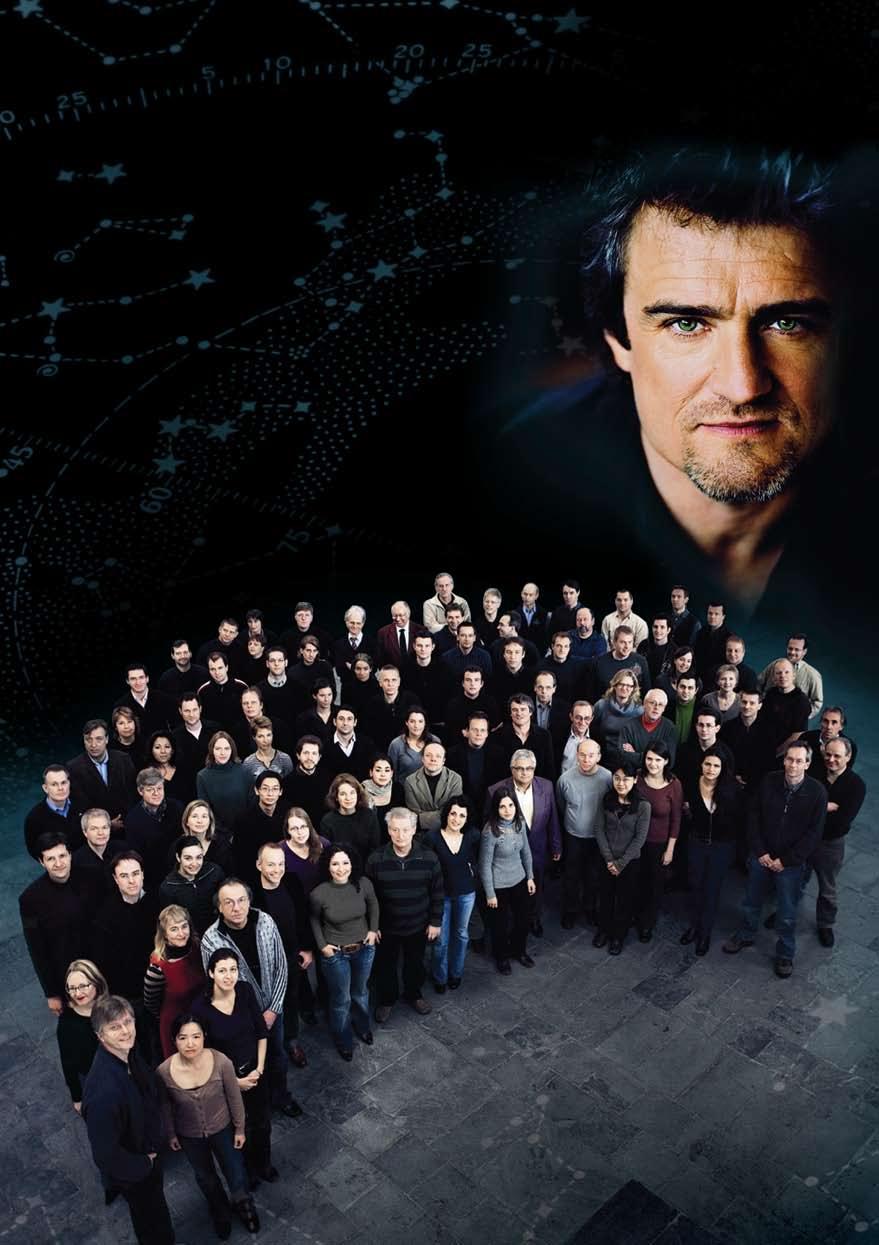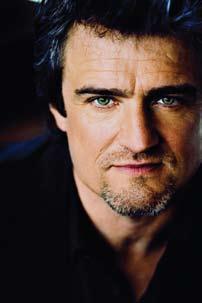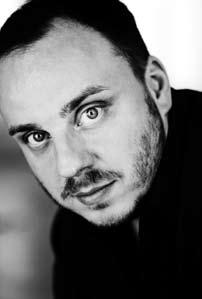
謝謝 With thanks to

梅茲馬赫
Ingo Metzmacher
指揮/音樂總監
Conductor / Music Director
梅茲馬赫2007年9月起接任柏林德意 志交響樂團藝術總監。由於積極推動 二十世紀作品,以創新的節目安排名 揚四海,是當今國際樂壇指揮名家。
梅茲馬赫1957年生於漢諾威,曾在 漢諾威、薩爾茨堡和科隆學習鋼琴、 樂理和指揮。他的演藝事業始於法蘭 克福現代合奏團,先任鋼琴手,後轉 職指揮,他同時受聘於法蘭克福歌劇 院,在米高.吉倫手下工作;1988 年在布魯塞爾指揮施雷克歌劇《遙遠 的聲音》首演是他事業的重大突破。
他隨後獲邀在德累斯頓、漢堡、史圖 加、巴黎和洛杉磯的歌劇院客席演 出;1997年獲聘為漢堡歌劇院音樂總 監,在多齣譽滿國際樂壇的歌劇製作 中擔任指揮,前後共八個樂季。
輝煌往績包括:1999至2004年在漢 堡舉行的除夕音樂會《誰害怕二十 世紀音樂?》,反應非常熱烈;還有 1993年薩爾茨堡音樂節演出諾諾《普 羅米修斯》,以及1995至1999年間擔 任班貝格交響樂團首席客席指揮時, 合作灌錄哈特曼交響曲全集(EMI發 行)。此外,他與柏林愛樂樂團的首 次合作,是指揮亨策第九交響曲的世 界首演,現場錄音唱片由EMI發行。


Appointed as Music Director of the Deutsches Symphonie-Orchester Berlin in September 2007, Ingo Metzmacher’s innovative programmes and passionate commitment to the music of the 20th century have firmly established him as a leading international conductor. Born in Hannover in 1957, Metzmacher studied piano, music theory and conducting in Hannover, Salzburg and Cologne. He found his first artistic home at the Ensemble Modern in Frankfurt, initially as pianist and later as conductor. During this period he also worked under Michael Gielen at Frankfurt Opera. He achieved his breakthrough in 1988 when he conducted the premiere of Schreker’s opera Der ferne Klang in Brussels. This was followed by guest appearances at the opera houses of Dresden, Hamburg, Stuttgart, Paris and Los Angeles. In 1997 he was appointed General Music Director of the Hamburg Opera where he conducted a series of internationally acclaimed productions over a period of eight seasons.
Highlights of Metzmacher’s career include a series of highly acclaimed New Year’s Eve concerts in Hamburg from 1999 to 2004, entitled Who is Afraid of 20thCentury Music?, his production of Luigi Nono’s Prometeo at the Salzburg Festival in 1993 and his recording of the complete symphonies of Karl Amadeus Hartmann for EMI with the Bamberg Symphony Orchestra, where he was Principal Guest Conductor from 1995-99. For his debut with the Berlin Philharmonic Orchestra he conducted the world premiere of Hans Werner Henze’s 9th Symphony which was recorded live by EMI.
華格納 (1813-1883)
馬勒 (1860-1911)

中場休息
布魯克納 (1824-1896)
《羅恩格林》前奏曲
《亡兒之歌》
旭日初升時燦爛如昔
如今我終於明白那陰鬱的目光 你媽媽走進門來
我時常想,他們只是外出走走 在這疾風迅雨的時候
男中音 馬賽厄斯.戈爾納
6 March 2009 (Friday)
2009年3月6日(星期五)
Richard Wagner (1813-1833)
Gustav Mahler (1860-1911)
E大調第七交響曲
中庸的快板
慢板:甚莊嚴及緩慢
諧謔曲:甚快
終曲:流動地,但不太快
Prelude to Lohengrin
Kindertotenlieder
1. Nun will die Sonn’ so hell aufgehn
2. Nun seh’ ich wohl, warum so dunkle Flammen
3. Wenn dein Mütterlein
4. Oft denk’ ich, sie sind nur ausgegangen
5. In diesem Wetter, in diesem Braus baritone Matthias Goerne
— Interval —
Anton Bruckner (1824-1896)
Symphony No. 7 in E
Allegro moderato
Adagio: sehr feierlich und langsam
Scherzo: sehr schnell
Finale: Bewegt, doch nicht zu schnell
演出長約1小時50分鐘,包括一節中場休息
Running time: approximately 1 hour and 50 minutes with one interval
華格納
《羅恩格林》前奏曲
華格納早期的歌劇風格,參照蔚為風 尚的法式歌劇,到了1846年,他卻 在《羅恩格林》的故事裏發現自己的 德意志聲音。《羅恩格林》講述中世 紀一個神祕的聖杯騎士奉命為美人艾 爾莎戰鬥;雖說劇中最有名的樂曲是 〈結婚進行曲〉,但〈前奏曲〉卻為 全劇添上宗教意味。〈前奏曲〉的 「聖杯主題」(聖杯是耶穌在最後的晚 餐時喝酒用的杯子,在中世紀意義重 大)先由小提琴奏出高音,然後由其 他樂器承接,音量漸漸變強後減弱, 為布幕拉起的時刻作準備。
馬勒 亡兒之歌
傑出交響曲作曲家馬勒傳世作品包括 幾套聯篇歌曲,卻沒有像《亡兒之
歌》那樣令他困擾。《亡兒之歌》寫 於1902年,歌詞出自佛德列克.魯克 特詩作。魯克特曾為不少馬勒的歌曲 作詞,他在兩個孩子早夭後,寫下多 首輓歌,馬勒就選取了其中五首,寫 成一套樂團伴奏的歌曲。
樂曲出版後四年,馬勒的女兒死於猩 紅熱。馬勒老覺得這套作品與女兒夭 亡有關,一直不能釋懷;五年後,馬 勒自己也撒手塵寰,終年才51歲。
〈旭日初升時燦爛如昔〉渴求慰藉; 孩子的眼睛在〈如今我終於明白那陰 鬱的目光〉裏化作星星;獨奏英國號 在〈你媽媽走進門來〉描摹孩子跟着 媽媽進屋的景象,音樂突然變得猛 烈,然後萬籟俱寂;〈我時常想,他們 只是外出走走〉刻畫孩子冒雨外出; 〈在這疾風迅雨的時候〉則是渴求希 望與平安的搖籃曲。
Richard Wagner’s first operas were styled upon the trendy French spectacles. But in 1846, Wagner found his own German voice in this story of a mysterious medieval Knight of the Holy Grail, who is sent to fight for Elsa, a beautiful lady. The most famous single piece is the Wedding March, but Wagner’s Prelude gives the religious significance of the opera. One constant theme is the Holy Grail the cup from which Jesus drank during the Last Supper, an icon of great significance during the Middle Ages. This appears in the high violins, then the other instruments, rising in volume, and then becoming quieter, preparing for the opening curtain of the opera.

Gustav Mahler Kindertotenlieder
The great symphonist Gustav Mahler wrote several song-cycles, but nothing haunted him more than these Kindertotenlieder (Songs on the Death of Children). He composed the work in 1902, basing the songs on the poems of Friedrich Rükcert. Rükcert wrote many of Mahler’s songs, but after the poet’s two children died, he wrote a series of elegies from which Mahler chose five to compose for voice and orchestra.
Four years after publication, Mahler’s own daughter died of scarlet fever. Mahler could never rid himself of his feeling that somehow the songs had something to do with his own tragedy, and five years later, he himself died at the early age of 51.
Now the Sun Will Rise as Brightly, seeks for universal consolation. In Now I See Well Why With Such Dark Flames, the children’s eyes are transformed into stars. In When Your Mother Steps Into the Doorway a child enters with her mother to a solo by English horn; there is sudden violence and all is silent. Often I Think That They Have Only Stepped Out pictures the children going out in the rain. In This Weather, In This Windy Storm is a cradle song for hope and peace.


旭日初升時燦爛如昔 旭日初升時燦爛如昔 彷彿夜裏未逢劫難。
厄運只降臨在我身上。 太陽──如常普照世人。
別將黑夜埋藏於心; 應將黑夜化作永恆之光。 我家的小亮光熄滅了。 世間喜樂之光,歡迎。
如今我終於明白那陰鬱的目光 如今我終於明白那陰鬱的目光 為何會常常在你臉上閃現。
眸子啊!彷彿好好看一眼 就能凝聚一切力量。
而我,身墮命運織成的 重重迷霧裏, 茫然不知這道光芒快要乘風而去, 回到那萬千光華的源頭。
亮晶晶的眸子,但願你們能跟我說: 但願我們能欣然留在你身旁, 可惜命運卻不允許。
看着我們吧,因為我們快要飄然遠去! 現在,你覺得那不過是眼睛 將來,那就是我們夜空裏的星星。
你媽媽走進門來
你媽媽
走進門來,
我回首一瞥, 目光所到之處
卻先不是她的臉龐,
而是那
靠近門檻的地方;
那兒
就是你可愛的小臉, 那是你興高采烈 走進來的當兒──
宛如往昔,我的小女兒。
你媽媽
走進門來,
提着的蠟燭微微閃爍,
我總覺得
你也會跟在媽媽身後,
Now the Sun Will Rise as Brightly
Now the sun will rise as brightly as if no misfortune had occurred in the night. The misfortune has fallen on me alone. The sun it shines for everyone. You must not keep the night inside you; you must immerse it in eternal light. A little light has been extinguished in my household; Light of joy in the world, be welcome.
Now I See Well Why With Such Dark Flames
Now I see well why with such dark flames your eyes sparkled so often. O eyes! It was as if in one full glance you could concentrate your entire power.
Yet I did not realize because mists floated about me, woven by blinding fate that this beam of light was ready to be sent home to that place whence all beams come.
You would have told me with your brilliance: we would gladly have stayed near you, But it is refused by Fate. Just look at us, for soon we will be far! What to you are only eyes in these daysin future nights shall be stars to us.
When Your Mother Steps Into the Doorway
When your mother Steps into the doorway
And I turn my head To see her, My gaze does not alight First on her face, But on the place Nearer to the threshhold; There, where Your dear face would be When you would step in With bright joy, As you used to, my little daughter.
When your mother Steps into the doorway
With the gleam of a candle, It always seems to me as if You came in as well,
馬賽厄斯.戈爾納
Matthias Goerne
男中音
Baritone
馬賽厄斯.戈爾納以溫暖流暢的聲線 和深刻的演繹見稱,在國際樂壇廣受 讚譽;他尤擅德國藝術歌曲,經常獲
邀在著名藝術節和表演場地演出,包 括紐約卡內基音樂廳和倫敦威格摩爾 音樂廳。
戈爾納經常與各國頂尖樂團和指揮合 作,在著名藝術節和表演場地亮相; 更在2007/08樂季巡迴世界各地演
出,期間曾與紐約愛樂樂團、三藩市 交響樂團和巴黎交響樂團攜手。
歌劇方面,戈爾納曾在紐約大都會歌 劇院、倫敦高文園皇家歌劇院、馬德 里皇家劇院、德累斯頓歌劇院、薩爾 茨堡音樂節和日本齋藤秀雄藝術節演 出,飾演過的角色包括《唐懷瑟》的 沃爾夫倫、《低地》的塞巴斯蒂安、 《特里斯坦和伊索爾德》的庫汶那 爾、貝爾格《伍采克》的主角和萊曼 《李爾》的主角。
2001年,戈爾納獲委任為倫敦皇家音 樂學院榮譽會員,2001至2005年間曾 出任杜塞爾多夫舒曼音樂學院藝術歌 曲演繹教授。


Matthias Goerne has received worldwide praise for his warm, fluid baritone and his profound interpretations. Highly respected as a Lieder singer, he is a frequent guest at renowned festivals and prestigious venues including New York’s Carnegie Hall and London’s Wigmore Hall.
Goerne frequently appears with the world’s foremost orchestras and conductors at leading venues and festivals. He toured internationally during the 2007/08 season and performed with the New York Philharmonic, San Francisco Symphony and the Orchestre de Paris.
Goerne has appeared as an opera singer at the Metropolitan Opera, New York, the Royal Opera House Covent Garden, London, Teatro Real, Madrid, Dresden Semperoper, the Salzburg Festival and the Saito Kinen Festival, Japan. His carefully chosen roles include Wolfram in Tannhäuser, Sebastiano in Tiefland, Kurwenal in Tristan and Isolde and the title roles in Alban Berg’s Wozzeck and Aribert Reimann’s Lear.
In 2001 he was appointed Honorary Member of the Royal Academy of Music, London. From 2001-05 he held a teaching position as a Professor of Lied Interpretation at the Schumann Hochschule, Düsseldorf.

巧的成份。「純五度音程」倒是清晰 可聞,象徵「天使」的純潔。
貝爾格在第二樂章指示小提琴「節奏 不斷變化,像演奏華彩樂段一般」。
有說貝爾格在此刻畫一場與死亡的角 力。在這場角力的高潮時,節奏突然 變得尖銳──貝爾格在歌劇也曾以相 同手法象徵死亡。
現在來到古今所有協奏曲最感人的段 落了。和聲和線條都改變了,貝爾格 襲用巴赫清唱劇《我心滿足》的片 段。樂章初時聽來像是巴赫作品,但 貝爾格卻寫了兩段變奏,還加上現代 和聲。最後小提琴不斷攀升,仿如往 天堂飛去似的;樂團其他弦樂器卻步 步下沉至極低音區,奏出最初的「純 五度音程」──這是死亡與和諧。
布拉姆斯
E小調第四交響曲,作品98
身在阿爾卑斯山高處埋首創作的布拉 姆斯說:「這兒的櫻桃總是太生澀, 不能吃。所以要是你不喜歡這東西的 味道,別擔心。」他口中的「東西」
就是他最後一首交響曲──一首集激 情、安寧和出人意表的終樂章於一身 的交響曲。
1897年(布拉姆斯逝世前幾個月), 維也納愛樂樂團演出這首交響曲,每 個樂章完結時觀眾也鼓掌喝采,直至 最後年邁的作曲家本人淚流滿面地出 現,觀眾才停下來。
有人說,布拉姆斯第四是老人家寫的 恬靜之作,但其實布拉姆斯寫作此曲 時才52歲。第一主題以不同方式組合 的兩音音型為主,充滿憂鬱和渴望。
主題過後,布拉姆斯沒有按常用的奏 鳴曲式寫作,取而代之的是一連串表
the rhythm sharpens suddenly the same inflection which Berg used in his opera to show death.
Now comes one of the moving sections of any concerto. The harmonies and lines change, and Berg quotes a section from a Bach cantata, Es ist genug “It is enough”. At first, it sounds like Bach, but Berg repeats it with two variations and modern harmonies. At the end, the violin ascends, as if to heaven. The other strings of the orchestra descend into the depths, sounding that original “perfect fifth”. It is death, reconciliation.

Johannes Brahms Symphony No. 4 in E minor, Op. 98
“The cherries never get ripe for eating in these parts, so don’t be afraid if you don’t like the taste of the thing”. said Brahms when working in the high Alps.
That “thing” was his final symphony, which summons up passion, serenity and a last-movement revelation
But in 1897, a few months before his death, the Vienna Philharmonic played this symphony and audience applauded after each movement, not ceasing until the old composer finally appeared, with tears running down his cheeks.
The work has been called the serene work of an old man, but Brahms was only 52 when he wrote it. Yet the first theme is that of melancholy and longing, although it consists mainly of two notes played in different fashion. After that, the movement proceeds not with the usual sonata form, but through a series of melodies each with different emotions. The opening theme is developed, and the melodies bring forth the finale.
The Andante moderato has the rarest moments in all in Brahms. The first melody appears in clarinets and
柏林德意志交響樂團


Deutsches Symphonie-Orchester Berlin
首席指揮及音樂總監
Principal Conductor and Music Director
第一小提琴 First Violins
Bernhard Hartog
Concertmaster
Wei Lu
Concertmaster
Katja Lämmermann
Associate Concertmaster
Olga Polonsky
Ingrid Schliephake
Stefan Bitto
Isabel Grünkorn
Karsten Windt
Ioana-Silvia Musat
Mika Bamba
Dagmar Schwalke
Ilja Sekler
Pauliina
Quandt-Marttila
Nari Brandner
Nikolaus Kneser
Michael Mücke
Elsa Brown
Ksenija Zecevic
第二小提琴
Second Violins
Andreas Schumann
Principal
Eva-Christina
Schönweiß
Principal
Johannes Watzel
Associate Principal
Clemens Linder
Rainer Fournes
Matthias Roither
Stephan Obermann
Eero Lagerstam
Tarla Grau
Jan van Schaik
Uta Fiedler-Reetz
Bertram Hartling
Kamila Glass
Marija Mücke
中提琴 Violas
Igor Budinstein
Principal
Annemarie Moorcroft
Principal
Birgit Mulch-Gahl
Associate Principal
Verena Wehling
Dieter Vogt
Eva Hollerbuhl
Leo Klepper
Andreas Reincke
Lorna Marie Hartling
Henry Pieper
Anna Bortolin
Raphael Sachs
Eve Wickert
大提琴 Cellos
Andreas Grünkorn
Principal
Mischa Meyer
Principal
Dávid Adorján
Associate Principal
Adele Schneider-Bitter
Andreas Lichtschlag
Mathias Donderer
Thomas Rößeler
Catherine Blaise
Claudia Benker
Leslie Riva-Ruppert
Sara Minemoto
Christopher Jepson
低音大提琴
Double Basses
Peter Pühn
Principal
Matthew McDonald
Principal
Christine Felsch
Associate Principal
Gregor Schaetz
Christian Schmidt
Gerhardt
Müller-Goldboom
Matthias Hendel
Ulrich Schneider
Rolf Jansen
長笛 Flutes
Kornelia Brandkamp
Principal
Ingo Metzmacher
Gergely Bodoky
Principal
Raphael Weidlich
Associate Principal
Frauke Leopold
Frauke Ross Piccolo
雙簧管 Oboes
Martin Kögel
Associate Principal
Isabel Mayer
單簧管 Clarinets
Richard Obermayer
Associate Principal
Bernhard Nusser
Joachim Welz
Bass Clarinet
巴松管 Bassoons
Karoline Schick
Principal
Jörg Petersen
Principal
Douglas Bull
Associate Principal
Hendrik Schütt
Markus Kneisel
Contra Bassoon
圓號 Horns
Barnabas Kubina
Principal
Ozan Cakar
Associate Principal
Christian Auer
D. Alan Jones
Georg Pohle
Joseph Miron
小號 Trumpets
Joachim Pliquett
Principal
Falk Maertens
Principal
Heinz Radzischewski
Associate Principal
Raphael Mentzen
Matthias Kühnle
長號 Trombones
András Fejér
Principal
Andreas Klein
Principal
Susann Ziegler
Rainer Vogt
大號 Tuba
Johannes Lipp
豎琴 Harp
Elsie Bedleem
Principal
定音鼓 Timpani
Erich Trog
Jens Hilse
敲擊樂 Percussion
Roman Lepper
Principal
Henrik Magnus
Schmidt
Associate Principal
Thomas Lutz
桂冠指揮
Conductor Laureate
Kent Nagano
管理 MANAGEMENT
常務董事 Managing Director
Alexander Steinbeis
樂團經理
Orchestra Manager
Sebastian König
巡演經理
Tour Manager
Konstanze Klopsch
